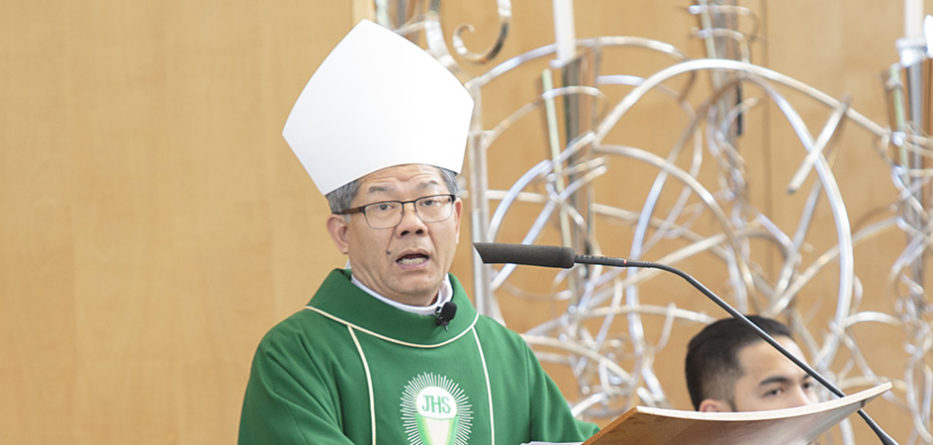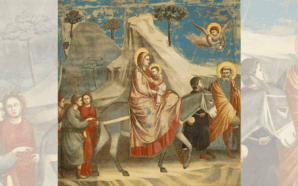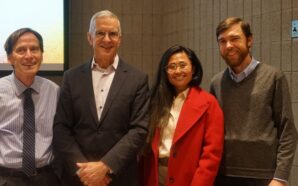Most Reverend Vincent Long Van Nguyen OFM Conv DD STL, Bishop of Parramatta
Homily for the 12th Sunday in Ordinary Time, Year B
Readings: Job 38:1,8-11; Psalm 106(107):23-26, 2832; 2 Corinthians 5:14-17; Mark 4:35-41
23 June 2024
Responding with prophetic courage as we move into deeper waters
Dear friends,
We live in a society that is addicted to the status quo, even when the status quo is no longer viable moving forward. This is evident in the way many respond to the crisis of the ecological collapse, the profit-based system, the rule of law to name but a few. We are reluctant to embark upon a pathway that might challenge our sense of prosperity, security, normalcy and comfort.
The Church too is not free from the fear and anxiety about change either. Pope Francis and his vision of the synodal Church have caused unease and even fierce opposition in some quarters. We are organised in our lives, in our communities and churches around order, control and stability. We fear disruption and resist change. Yet the call of the God of the journey is not necessarily security at all costs. We must be prepared to interrogate and even let go of our addiction to certainty in order to blaze a new pathway into the future.
This Sunday’s scripture provides us with the inspiration to discern critically and to act boldly according to the direction of the Spirit. The God that Jesus reveals is a dynamic and boundary-breaking God. Instead of a safe harbour, God pushes us out to turbulent waters in order to expand the boundaries of our engagement. More importantly, this God empowers us to follow the pattern of life and behaviour of the Beloved in his constant journey of self-emptying and downward mobility.
In the first reading, we hear God’s response to Job in a series of rhetorical questions. Job was at the lowest ebb of his life. He had undergone every adversity imaginable. He had lost his reputation, social standing, possessions and most of all, his children. As he sat on a dung heap, his wife and his best friends mocked him. It was the ultimate betrayal and humiliation. Job was tested to the limits of his endurance.
God does not wave a magic wand. He does not address Job’s predicament directly. Job already shows great maturity by rejecting the simplistic idea that success is the ultimate measure of one’s faith. We could say that the Book of Job is an indictment of the Gospel of prosperity that falsely reduces faith to a means to self-entitlement and well-being. God who speaks from the tempest refutes such caricatures and distortions. Faith can never be equated with health and wealth. God is far greater than what human beings try to reduce him to. Only with humility can we begin to appreciate the grandeur and greatness of God.
The Gospel tells us about a story of Jesus and his disciples crossing over to the other side of the sea. The story bears surprising parallels to the Jonah story in the Old Testament. In both accounts, there are the storm, the fear on the part of those on board and the main character who is asleep through it all. Even more crucial is the fact that they manifest the God who challenges the people to move beyond their familiar worlds. In Jonah’s case, it was to Niniveh, which was the capital of Israel’s archenemy, the Babylonian Empire. In the disciples’ case, it was Jesus who accompanied them on their missionary journey outside their safe world.
In the context of the early Church moving beyond its Jewish origins, the story aims at something much more profound than the recognition of Jesus’ miraculous powers. It is a summons to a greater faith as the small group of homogenous people evolved into a universal reality, with all the complexities that it brought. Jesus’ words to the frightened disciples are a reminder to us to trust in His power and to meet the challenges of the world we have been ushered into.
Just as Jesus and His disciples faced the storm when they crossed the familiar territory, we are also facing a time of chaos as we move beyond the safe harbour of Christian society. Not only are we leaving behind the cultural Christianity that once dictated the customs, practices and even ethics of this nation, we are becoming a minority facing insurmountable odds. But as He was then with them, Jesus is now with us. He accompanies us not by intervening and changing the circumstances in our favour. Rather, He shows himself as He always did to His disciples, by His total solidarity and vulnerability. It is our faith and discipleship that see us through.
Dear friends,
The Word of God today encourages us to discern God’s will in crisis and to boldly walk the new pathway. The example of the early Christian community shines as a light in the dark. Against the ingrained culture of fear and defence of the status quo, they showed us the prophetic courage of going out of themselves and embracing the people outside their circle, on the other side of the lake. They showed the world what it was like to be a vessel for social transformation.
Our Diocesan Synod was an expression of the same prophetic courage. With Pope Francis, we too seek to move beyond a tribal vision of Catholicism of yesteryear so that we can be a Church that is more aligned with the poor, more humble, more participatory, more synodal, more ready to listen, to learn and work with others for the common good. May the love of Christ impel us to go forward responding to the signs of the times and becoming the catalysts for God’s kingdom in the world.








